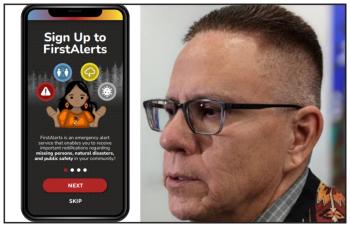Image Caption
Local Journalism Initiative Reporter
Windspeaker.com
The James Smith Cree Nation in Saskatchewan is implementing an emergency alert system created by Indigenous people for Indigenous people.
“We were just walking around sort of in chaos, responding to this emergency, thinking it was an isolated incident,” said Chief Robert Head of Peter Chapman Band. He was speaking of the September 2022 stabbing spree carried out by Myles Sanderson that resulted in 11 people being killed and 17 injured at James Smith Cree Nation and in the nearby village of Weldon.
“(We were) not knowing the full picture of a larger attack in the community in many places and towards many people, so an emergency alert app could have given the membership heads up that morning,” said Head.
Peter Chapman is one of the three bands that comprises the James Smith Cree Nation. The Nation also includes the Chakastaypasin Band and the James Smith Cree Nation.
The app, a joint effort of the Federation of Sovereign Indigenous Nations (FSIN) and TryCycle Data Systems, was announced this morning, barely two weeks after the conclusion of the coroner’s inquest into the September tragedy.
One of the 15 recommendations that came from the inquest was for the federal public safety minister to establish a national alerting system in consultation with law enforcement on a platform where the public can sign up to receive the broadcast of immediate alerts.
FirstAlerts is a new feature in the Talking Stick app and is a free download in the App Stores, also co-created by the partners.
Head says that although the RCMP did issue an alert Sept. 4, 2022, “it was hours into the attacks that day.”
Had James Cree Smith Nation had its own emergency alert, the warnings could have been timely and included the local names for the areas of the reserve that members had to be aware of, says Head.
“We know our community. There's all kinds of different areas that have nicknames. If we can just have our own system in place then we can style the message where it will be most meaningful and powerful for our membership,” he said.
“We’ve listened to the voices of First Nation leaders, echoing the urgent need for effective ways to communicate with their membership during a crisis. With the introduction of FirstAlerts in the Talking Stick app, we are putting the control of the messaging directly into the hands of Indigenous communities,” said John MacBeth, CEO of TryCycle Data Systems.
FirstAlerts will be employed in three situations: missing persons, natural disasters and public safety.
Head points out that a 911 call for a missing person results in a 24-hour wait. The local FirstAlerts can be issued right away.
As for natural disasters, Head notes that grass fires and bush fires can break out quickly.
“If there's a windy day and there's a fire that gets out of control and it's moving towards households in the community, the First Nation can get on this app and issue a warning to all the people (that there’s a) forest fire approaching from the west. ‘Everyone be on guard’ and that kind of thing,” said Head.
Placing the alerts on the app will be the responsibility of each First Nation’s emergency management services. Alerts will be verified before they are issued.
“It'll be a process for every First Nation to set up how the app will be initialized and used,” said Head.
Head and MacBeth expect other Saskatchewan First Nations will come on board in using the app. Head notes that interest has already been expressed by a couple.There are 74 nations represented by the FSIN.
The Talking Stick app was created to allow anonymous communication with trained Indigenous peer advocates who are ready to listen judgment-free and provide compassionate support. It’s only available in Saskatchewan. Launched in 2022, it has reached more than 22,000 Indigenous people.
Ottawa-based TryCycle Data Systems was established in 2017 to empower at-risk communities and vulnerable populations with accessible digital solutions.

